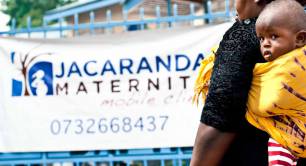Weaving women out of poverty in Afghanistan
Connie Duckworth empowers Afghan women through ethical, artisan-based employment, education and access to healthcare. Fergal Byrne talks to the founder of ARZU about leaving the banking world behind to become a successful social entrepreneur working to lift families out of poverty.
Jobs = Peace. Anywhere in the World. Even in Afghanistan.
This simple but bold equation sums up ARZU’s decade of direct experience empowering rural, illiterate Afghan weavers to lift themselves and their families out of poverty through ethically paid, real jobs.
ARZU, which means 'hope' in Dari, transforms lives in a place often considered the world’s worst for women by creating skilled artisan-based employment in villages where little or no other economic opportunity exists. By reformulating the notorious rug supply chain with its myriad of middleman, ARZU pays its employees above market wages and provides them with literacy and basic health care, while helping to build an eco-system to address the daily adversities faced globally by the desperately poor—lack of clean water, housing, nutrition and voice.
From a starting point of 30 women carpet weavers, ARZU has created more than 700 jobs. Skilled weavers produce award-winning rugs in classic and, surprisingly, modern patterns—some designed the world’s most iconic architects, including Zaha Hadid, Frank Gehry and Robert A.M. Stern.
For the unskilled, the elderly and even high school girls, part-time work is available making fair-trade, trendy Peace Cord® bracelets, often custom ordered by other affinity groups and charities branded with their logos, who then resell them to raise funds for their own missions.
Fergal Byrne: So, what makes ARZU work in Afghanistan, where so many projects have failed despite the enormous sums of foreign aid flowing in?
Connie Duckworth: After seeing firsthand the harsh conditions facing Afghan women during trip there in 2004, I set out to experiment with alternative approaches to traditional international development that were based on an entrepreneurship rather than charity.
We follow the start-up mantra – 'Partner or die'.
My objective from the outset was to test a new model that could self-fund critical social programmes through the sale of real export quality, market based product. Central to ARZU’s approach is our Social Contract with weaver families. To be a registered ARZU weaver and receive fair labour wages and bonus payments, families must agree to send all of their children under the age of 15 to school full-time and to have women in the household attend literacy classes.
We follow the start-up mantra – 'Partner or die'. It’s important to identify which organisations are working around you to see which may already doing something and doing it well. Partner with them on the piece that overlaps with your business model. Funding is always scarce, so don't be redundant.
We work closely with provincial and local leaders. Nothing imposed from the outside is going to work and we get a lot of good advice that way. A decade in, we have built enough credibility that new pilots and new programmes are met with enthusiasm from local people who see us as part and parcel of their community.
FB: Why did you choose rugs?
CD: The rug industry is one of Afghanistan’s most promising legal economic drivers. Plus, it’s the only culturally acceptable work available to rural women.
Importantly, if we could meet international quality standards, we’d have a real export product. There are talented artisans in most developing countries. However too often their skills are directed to making what I call, the tribal souvenir – the beaded change purse, the little scarf.
Those are not products that can drive cash flow in a business. Not knowing anything about traditional international development practices, I was aiming to create a virtuous funding cycle, where ultimately the cash flow and revenues from the sales of true export quality product would sustainably fund, not only the cost of production, but also this eco-system of social benefits.
FB: What have been your results?
CD: Real outcomes speak for themselves. From a starting point of 30 women carpet weavers, ARZU has created more than 700 jobs.
ARZU’s rural weavers earn 68% more than the average Afghan per capita income; 100% read and write; 55% own their own homes (as compared to 67% in developed countries); 20% have a child in college; and there’s not been a single maternal death from childbirth since 2006.
After auditing all NGOs nationwide, the Afghan Ministry of Economy just ranked ARZU #1 in Bamyan Province.

Afghan woman weaving. Photo credit: ARZU
FB: Could the model be transferable to other parts of the world?
CD: If it works in Afghanistan, the ARZU model can work anywhere. My hope is that larger organisations working in other parts of the world will test our protocols and replicate and scale our model.
FB: Can you tell me a little bit about your background and what brought you to ARZU?
CD: My background might be somewhat different than many social entrepreneurs.
I actually came from the business world, armed with an MBA and a 25-year career in investment banking. While social entrepreneurship may sound a bit out of my wheelhouse, the advantage I bring to the sector is seeing the world through a business lens, where the definition of sustainability is profitability. The problem with traditional foreign aid is that that progress stops when the money stops.
And, the money always stops. ARZU’s aim has always been to be profitable, and therefore sustainable.
FB: What inspired you to leave the world of banking? What made you want to do something that would make a difference?
CD: Starting at university, my personal passion has always been women's rights and particularly women's economic empowerment. I’ve been involved in many aspects of this cause over the years and have developed a personal motto, “She with the chequebook controls the agenda.” I find this to be completely cross-cultural—it’s true in any country at any time.
In countries like Afghanistan, where women are too often considered chattel, I've seen the kind of transformation that a paying job drives. As typically the sole wage earner in the household, ARZU weavers are treated with greater respect and have more say in the lives of their children. The balance of power subtly shifts, because money talks. I have come to believe that the dignity of work is a human right.
FB: Who's inspired you to keep going over this time?
CD: Without question it's the Afghan women who we work with on a daily basis. Whenever I feel like I'm having a tough day, I pick up one of our family histories--we capture these personal stories at the outset and update them annually—to recognise that my worst day is a day these women would dream to have.
They are my inspiration. They keep me going. Learning is a two way street. While ARZU has impacted their lives, I know that the strength of these women—their tenacity and hope—is an example to all who engage in ARZU’s mission, from the conscious consumers, designers and responsible corporations who choose our rugs for their spaces to the students eager to learn more about social entrepreneurship, to the donors who generously provide funding. We are all the richer for it.
Photo credit: ARZU



